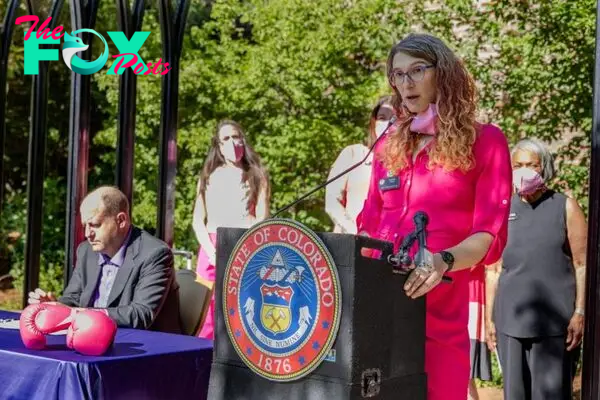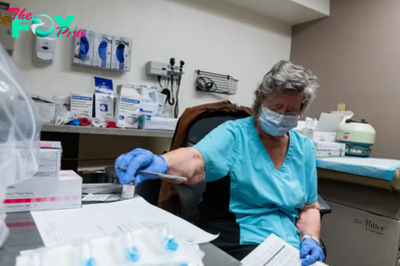Health
Colorado middle and high schools must provide free period products to students by 2028
A survey of more than 200 Colorado students showed 90% of teen girls have started their menstrual cycle unexpectedly at school or during a school-related activity when they didn’t have access to period products.
Eighty percent of those girls missed class because they didn’t have a pad or tampon; 72% of them used a substitution in place of a typical period product within a year before the study was conducted such as toilet paper, paper towels and napkins; and 59% said they struggled to afford or access period products.
☀️ READ MORE
Independence Pass, Trail Ridge and more scenic byways across Colorado now open for the summer
Did U.S. Rep. Lauren Boebert request infrastructure funding from a bill she voted against?
Outside Festival deemed a success with 18,000 attendees helping forge a model for a new national outdoor recreation gathering
The January survey — conducted by Justice Necessary, a Colorado nonprofit working to increase access to hygiene products — helped to prove a piece of legislation signed by the Gov. Jared Polis on Wednesday evening is needed to help students access basic necessities. House Bill 1164 requires all Colorado middle and high schools to stock restrooms with free pads and tampons by 2028.
“No student should miss class because they do not have period products,” the bill’s co-sponsor State Sen. Janet Buckner said during a bill signing ceremony Wednesday evening at the governor’s mansion.
“This bill is going to help us keep kids in the classroom and underscores the need for more open conversations and better support regarding menstrual products and the menstrual cycle,” she said.
Access to period products isn’t just an urgent occasional need in schools. Year round, families struggle to purchase pads and tampons and their inability to afford basic hygiene products can interfere with their student’s attendance and good performance at school, according to Justice Necessary, which has provided 4.25 million period products to Colorado schools, food pantries and government organizations in less than four years.
Having free period products at school can reduce the embarrassment that comes with unexpectedly bleeding in class and can help students feel supported and dignified while learning, lawmakers said Wednesday.
“The stories that I hear are that students are using rags and they’re trying to wash those out and reuse them as period products or not changing them,” said Diane Cushman Neal, founder and president of Justice Necessary. “All of those are going to lead to more health issues and that’s going to put a higher burden of stress on our medical facilities.”
Increasing access to period products statewide
In 2022, Denver Public Schools leaders spent almost $20,000 on period products and dispensers for its elementary, middle and high school bathrooms. The school district, which has about 90,000 students, installed the products in 813 restrooms. In 2023, it spent just over $1,700, according to Alyssa Adams, a senior operations coordinator at Denver Public Schools, who spoke at a February House Education Committee meeting.
“That’s not a lot for a large district,” said State Rep. Brianna Titone, a co-sponsor of the bill. “A lot of schools should be able to absorb these minimal costs and we’re hoping they do see a benefit in increased attendance and performance of some of the students that will benefit from this.”
The Colorado Department of Education has since 2021 offered small grants to districts that can’t afford to absorb the cost of tampons and pads for students. The Menstrual Hygiene Products Grant program was funded by Senate Bill 255 that year.

A school is eligible to apply for a grant if at least 50% of its students qualify for free or reduced-cost lunch, a measure of poverty. Grant awards have ranged from $1,000 to $5,000 per school per year, according to a fiscal note for House Bill 1164. This school year, 34 schools were awarded grants.
Senate Bill 255 allocated $100,000 to the state grant fund each year. The bill passed this year allocates an additional one-time sum of $100,000 to support schools that can’t afford period products and dispensers.
The new law requires middle and high schools to provide free menstrual products in at least 25% of girls’ and gender-neutral student bathrooms by Jan. 30. Each year thereafter, the schools must increase their compliance by adding pads and tampons in 25% of their bathrooms, until June 30, 2028, when 100% of female and gender-neutral restrooms must be stocked with period products.
Some rural schools opposed House Bill 1164 because they feared the mandate would be costly and would force them to have to readjust their budgets, Titone said.
“Any time you’re putting a mandate that costs money onto a school, there’s going to be resistance to it,” Titone said. “But the health and dignity of students is worth this.”
There are more than 50 Colorado schools and school districts that already offer period products, according to an informal tracking done by Justice Necessary leaders.
In 2022, Garfield County School District 16 leaders received $4,200 through the state grant program to provide free period products to upper elementary, middle and high school students, said Jennifer Baugh, superintendent of the school district, which serves about 1,200 students from Parachute and Battlement Mesa.
“We spent the entire grant,” she said. “Once our supplies run low, we will apply again,” she said. “We have been grateful for the financial support to make menstrual products available to the students who need them.”
-

 Health1h ago
Health1h agoThe Surprising Benefits of Talking Out Loud to Yourself
-

 Health3h ago
Health3h agoDoctor’s bills often come with sticker shock for patients − but health insurance could be reinvented to provide costs upfront
-

 Health18h ago
Health18h agoWhat an HPV Diagnosis Really Means
-

 Health1d ago
Health1d agoThere’s an E. Coli Outbreak in Organic Carrots
-

 Health1d ago
Health1d agoCOVID-19’s Surprising Effect on Cancer
-

 Health2d ago
Health2d agoWhat to Know About How Lupus Affects Weight
-

 Health5d ago
Health5d agoPeople Aren’t Sure About Having Kids. She Helps Them Decide
-

 Health5d ago
Health5d agoFYI: People Don’t Like When You Abbreviate Texts



























